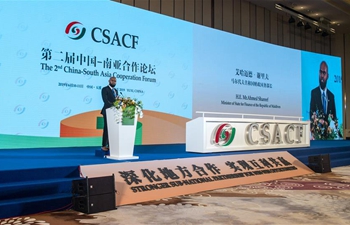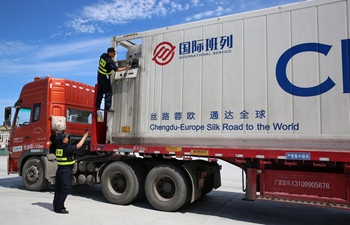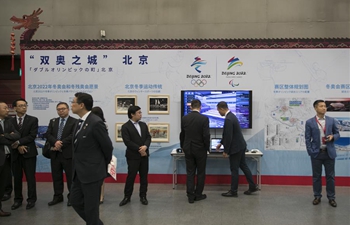
Takakage Fujita, director general of a civil group dedicated to upholding and developing the well-known Murayama Statement, receives an interview with Xinhua in Tokyo, Japan, June 6, 2019. (Xinhua/Ma Caoran)
TOKYO, June 10 (Xinhua) -- The United States is now seeking all kinds of pretexts to wantonly wield the big stick of tariff against China and other countries, a Japanese expert has said.
Takakage Fujita, director general of a civil group dedicated to upholding and developing the well-known Murayama Statement, made the remarks in an exclusive interview with Xinhua.
What the U.S. is doing is irresponsible and it will not only disrupt the world trade order but also undermine the prosperity of the world economy, Fujita said.
Two closely watched G20 (the Group of 20) meetings concluded in Japan on Sunday, and topics such as trade protectionism and its negative impact on the world economy were once again raised by various sides.
The G20 Finance Ministers and Central Bank Governors Meeting was held in Fukuoka, while ministers from G20 countries also wrapped up a two-day meeting on trade and digital economy in Tsukuba on Sunday.
Using tariffs as a tool, Fujita said, the U.S. government assumes that so long as it escalates economic and trade friction, relevant countries will compromise and its goals will be reached.
However, there won't be any winner, the expert noted.
It is not only China that will be hurt by the economic and trade friction provoked by the United States, he said, pointing out that U.S. farmers as well as U.S. industry associations have already issued warnings against such reckless acts of the U.S. government.
Being concerned about rising commodity prices, U.S. consumers have also questioned the moves, Fujita said. Fujita expressed the hope that the U.S. government will heed voices coming from within the country.
Continuous escalation of the economic and trade friction will lead to no where but bring more problems, the expert said, adding that the trade friction between the world's two largest economies will also hurt Japan, Asia and beyond.
Against the backdrop of ever deepening globalization, the ongoing trade spat is bound to impact global supply chains and disrupt the world trade order, Fujita said.
Many Japanese companies have invested and built factories in China, and industries in the two countries have been closely connected by industrial chains, he said.
Therefore, by provoking economic and trade friction against China and suppressing Chinese enterprises, the United States is also hurting Japanese enterprises, Fujita said, noting that Japanese industries hope for an early de-escalation of the friction.
He pointed out that the U.S. government's practices are wrong and irrational, and it is imperative to correct them as soon as possible and stop them from harming the world.
As the country with the largest economic volume in the world, the United States should, from the perspective of being conducive to the world peace and development, stop exerting pressure, return to talks, and solve issues through rational negotiation and consultation, Fujita said.
Talks are the only right choice, he added.











